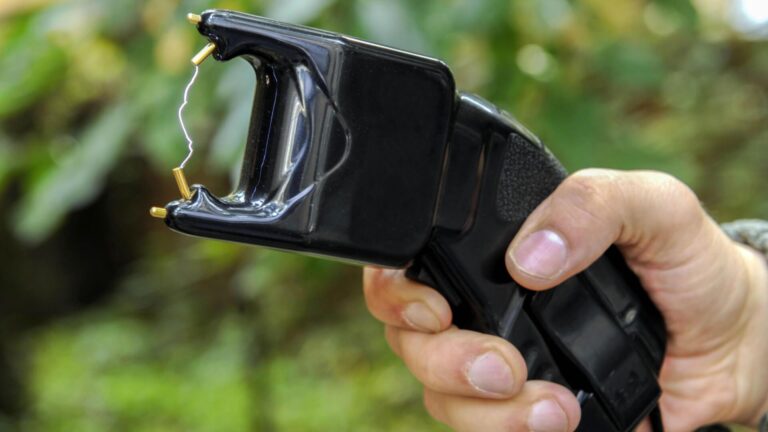Table of Contents
- Understanding the Legal Landscape of Stun Gun Permits Across States
- Key Background Check Requirements for Stun Gun Permit Approval
- Common Challenges and How to Navigate State-Specific Screening Processes
- Expert Recommendations for a Smooth and Compliant Permit Application Experience
- To Conclude
Understanding the Legal Landscape of Stun Gun Permits Across States
When it comes to stun gun possession, the regulatory framework varies significantly from one state to another, making it essential for prospective owners to familiarize themselves with the legal nuances before making a purchase. Some states classify stun guns as concealed weapons and therefore require a permit or license, while others allow open carry without restrictions. Moreover, background checks might be mandatory, often encompassing criminal history, mental health records, and in some cases, character references. Understanding these distinctions helps prevent legal pitfalls and ensures responsible ownership within the boundaries of local laws.
Key factors influencing stun gun regulations include:
- State-specific definitions: Certain states may categorize stun guns differently under self-defense weapon laws, impacting permit requirements.
- Age restrictions: Minimum age limits for purchasing or carrying a stun gun vary and are strictly enforced during background checks.
- Background screening scope: Some jurisdictions conduct comprehensive checks that can delay permit issuance, while others streamline the process for eligible candidates.
- Reciprocity agreements: States with mutual recognition policies may allow stun gun permit holders to carry legally across state lines, but this is rare and complex.
Key Background Check Requirements for Stun Gun Permit Approval
When applying for a stun gun permit, it’s crucial to understand the stringent background checks mandated by many states. Typically, these checks involve a comprehensive review of criminal history, focusing on any violent offenses, domestic violence convictions, or restraining orders that may disqualify an applicant. Additionally, several states require fingerprinting to cross-reference applicants against national databases, such as the FBI’s National Crime Information Center (NCIC). The goal is to ensure that individuals approved for stun gun possession are law-abiding citizens with no record of activities that could pose a public safety risk.
Beyond criminal history, some states also consider mental health evaluations, requiring applicants to provide proof of sound mental stability either through self-certification or documentation from a licensed professional. Other common prerequisites include proof of residency within the state, age verification (usually 18 or older), and sometimes completion of a safety training or education course. These multi-layered requirements reflect the delicate balance legislators strive for-allowing citizens to defend themselves while minimizing the risk of misuse or accidental harm.
Common Challenges and How to Navigate State-Specific Screening Processes
Navigating the landscape of stun gun permit background checks can often feel like decoding a complex puzzle, varying dramatically from state to state. One of the most frequent hurdles applicants face is the inconsistency in the documentation required. While some states accept a simple state-issued ID and proof of residency, others demand extensive records, including fingerprinting and detailed personal history. Understanding these nuances early on is critical. Notably, applicants should be prepared for the varying duration of background checks, which can range anywhere from a few days to several months, significantly impacting the timeline for obtaining a permit.
To successfully maneuver these challenges, it’s invaluable to:
- Research state-specific regulations: Use official state government websites or authorized resources to get the latest updates on permit requirements.
- Gather all necessary documentation upfront: Avoid delays by compiling identification, residency proof, and any required legal clearances before initiating the application.
- Seek professional advice: In states with particularly stringent processes, consulting a legal expert or a licensed firearms consultant can save time and prevent application denials.
Expert Recommendations for a Smooth and Compliant Permit Application Experience
When embarking on the permit application journey, meticulous preparation can make all the difference. Start by thoroughly researching state-specific requirements-from eligibility criteria to necessary documentation. Since laws vary widely, ensure you verify information from official government portals or trusted legal resources. Organizing your paperwork in advance, including proof of residency, identification, and any prior permits or licenses, can expedite the process and prevent unexpected delays. Additionally, consider scheduling appointments early, as some jurisdictions have limited slots that fill up quickly.
Transparency and accuracy in your application are paramount. Avoid common pitfalls such as incomplete forms or discrepancies in your background information by double-checking every detail before submission. If possible, consult with legal experts or permit specialists who can provide guidance tailored to your state’s nuances. Remember to keep copies of all submitted materials and correspondence for your records-this vigilance will help if any issues arise during background checks or follow-up verification. Lastly, stay informed about processing times and be patient; some states have lengthier review periods, but persistence and compliance ultimately lead to a smoother, stress-free experience.
- Verify eligibility criteria specific to your state.
- Prepare and review documentation meticulously.
- Consult trusted legal resources beforehand.
- Keep thorough records of applications and communications.
- Understand and respect processing timelines.
To Conclude
Navigating the complexities of stun gun permit background checks can feel overwhelming, but understanding the state-by-state requirements is crucial for staying compliant and ensuring your safety. Laws vary widely, from the stringency of background investigations to the specific criteria applicants must meet. By keeping informed and consulting local regulations, you can confidently navigate the permit process and exercise your rights responsibly. Stay proactive, stay safe, and remember-knowledge is your best defense when it comes to personal protection laws.Check Our Other Blogs
- StunGun – Your Trusted Source for Stun Guns, Laws, and Self-Defense Tips
- PepperSprayLaws – Your Trusted Resource for Pepper Spray Information
- StunGunLaws – Your Trusted Guide to Stun Gun Legality and Safety





